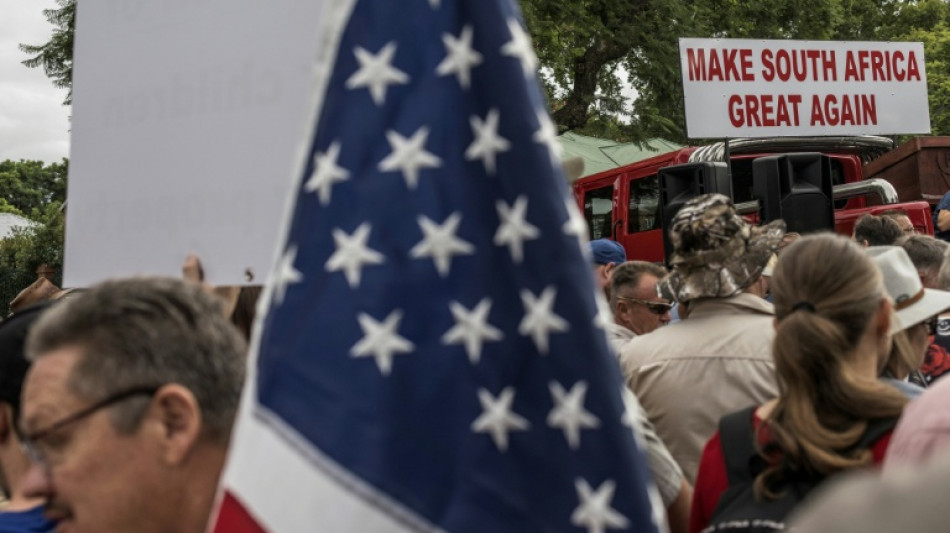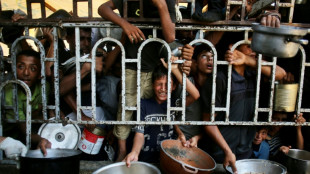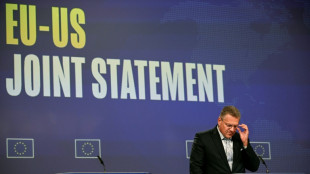
| RIO | 0.82% | 61.12 | $ | |
| RBGPF | 0% | 73.27 | $ | |
| CMSC | 0.04% | 23.45 | $ | |
| RYCEF | 1.36% | 13.94 | $ | |
| NGG | -1.02% | 71.35 | $ | |
| SCS | -0.15% | 16.155 | $ | |
| BCC | -0.55% | 84.04 | $ | |
| JRI | -0.15% | 13.31 | $ | |
| BTI | 0.19% | 59.12 | $ | |
| RELX | -1.14% | 48.14 | $ | |
| VOD | -0.63% | 11.825 | $ | |
| CMSD | 0.33% | 23.768 | $ | |
| BCE | -0.65% | 25.575 | $ | |
| GSK | 0.55% | 40.29 | $ | |
| AZN | 0.22% | 80.695 | $ | |
| BP | 0.18% | 33.94 | $ |

White S.Africans resettled in US did not face 'persecution': govt
The white Afrikaners who have accepted resettlement in the United States did not face "any form of persecution" in South Africa, the foreign ministry said on Monday.
It came hours after a first group of 49 white South Africans flew out of Johannesburg following US President Donald Trump's offer to grant refugee status to white Afrikaners.
Mainly descendants of Dutch settlers, Trump has said white Afrikaners face "racial discrimination" in South Africa, heightening tensions between the two countries.
"They can't provide any proof of any persecution because there is not any form of persecution to white South Africans or to Afrikaners South Africans," Foreign Minister Ronald Lamola told reporters.
Their claims that white farmers are targeted for murder -- despite official data that most victims of killings are young black men in urban areas -- have morphed into a myth of a "white genocide", also repeated by Trump.
The US president, whose tycoon ally Elon Musk was born in South Africa, said in February he would prioritise access to a refugee programme "for Afrikaners in South Africa who are victims of unjust racial discrimination".
"We are glad that a number of organisations, even from the Afrikaner structures, have denounced this so-called persecution," Lamola said, adding that preparations for a meeting between Trump and South African President Cyril Rampahosa were "very advanced".
"The crime that we have in South Africa affects everyone irrespective of race and gender," he said.
- 'Beyond absurd' -
The 49 left Johannesburg's main airport on a chartered flight on Sunday and are due to land in the United States on Monday.
Under eligibility guidelines published by the US embassy in South Africa on Monday, applicants must either be of Afrikaner ethnicity or belong to a racial minority in South Africa.
One must also "be able to articulate a past experience of persecution or fear of future persecution," it said.
The rapid pathway for resettlement comes at a time of heightened tensions between the two countries over several policy issues, including relations with China and BRICS membership.
America's biggest trading partner in Africa is also under fire from Washington for leading a case at the International Court of Justice, accusing US-ally Israel of "genocidal" acts in its Gaza offensive, a claim Israel denies.
Many have expressed indignation and bemusement that whites could be assigned victim status in South Africa and that the resettlement stands in stark contrast to the shutdown of all other refugee admissions in the US.
Loren Landau, who studies migration at the University of the Witwatersrand in Johannesburg, said while racism existed in South Africa, there was no evidence of systematic persecution of white people.
On the contrary, "foreigners are targeted by people making it clear that they want Somali, Pakistanis and Zimbabweans out of the country," he told AFP.
Prominent Afrikaner author Max du Preez said the resettlement was "beyond absurd" as South Africa had bodies to deal with any form of discrimination.
"This is about Trump and MAGA, not about us. Its about their hatred for DEI," he told AFP, referring to diversity programmes that have become a frequent Trump target.
"The people who have now fled have probably been motivated by financial considerations and/or an unwillingness to live in a post-apartheid society where whites no longer call the shots," he said.
Whites, who make up 7.3 percent of the population, generally enjoy a higher standard of living than the black majority of the country. They still own two-thirds of farmland and on average earn three times as much as black South Africans.
Mainly Afrikaner-led governments imposed the race-based apartheid system that denied the black majority political and economic rights until it was voted out in 1994.
P.Agius--JdM



